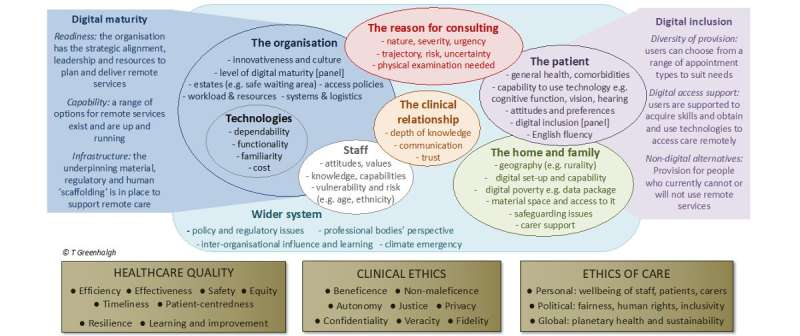This article has been reviewed according to Science X's editorial process and policies. Editors have highlighted the following attributes while ensuring the content's credibility:
fact-checked
peer-reviewed publication
proofread
Virtual consulting can significantly cut carbon footprint in health care, new study suggests

Virtual consulting is a new and emerging contributor to environmentally sustainable health care, according to findings of new research published in the Journal of Medical Internet Research.
The COVID-19 pandemic has accelerated the shift to virtual consulting, leading to its growing use. As health systems across the world strive to achieve net-zero carbon emissions, a critical question arises: what is the impact of virtual consulting on environmental sustainability in health care? A new research study led by Sara Shaw and team aims to address this question.
The study, titled "The Role of Virtual Consulting in Developing Environmentally Sustainable Health Care: Systematic Literature Review," was published in the Journal of Medical Internet Research on May 3, 2023. This study examines the impact of virtual consulting in health care on the environment, and how it might contribute to the net-zero agenda.
The researchers reviewed 1672 published studies and shortlisted 23 that focused on a range of virtual consulting equipment and platforms across different clinical conditions and services. Thanks to telemedicine appointments, including video- and telephone-based visits, patient travel time for face-to-face appointments has drastically reduced; thus, virtual consulting can be an effective way to reach environmental sustainability goals. These studies used different methods and approaches to estimate carbon savings, but despite their methodological inconsistencies, all studies concluded that virtual consulting significantly reduced carbon emissions.
However, most previous research has not evaluated wider factors such as patient suitability; clinical indication; and organizational infrastructure affecting the acceptance, use, and growth of virtual consultations.
"Health systems urgently need to become more environmentally sustainable. Our review clearly shows that virtual consultations offer one means to help with that. While adoption and spread of virtual consulting needs to be considered alongside a range of system, organizational, clinical and patient-related factors, when done well and at scale, they offer significant potential for carbon savings, primarily (though not only) through reductions in travel."
"The pandemic brought a big shift to virtual care—this is set to continue, and our findings suggest it will help to mitigate the effects of climate change," adds Professor Shaw, from University of Oxford.
Further work is now urgently needed to fully appreciate the extent of carbon emissions and potential for reductions, as well as other environmental impacts (e.g., electronic waste) across the entire clinical pathway, rather than on virtual consultations alone.
Stakeholders associated with virtual consulting services need to better appreciate the potential for reductions in emissions and weigh this up in relation to the benefits and potential risks (e.g., adverse events, missed diagnoses) related to providing or scaling up such services.
To see a rapid and pronounced change, both funders and evaluators need to routinely include carbon footprint modeling into their design and methods, as well as fully engage with the transdisciplinary endeavor of reviewing, monitoring, and addressing issues of environmental sustainability.
More information: Martha Pickard Strange et al, The Role of Virtual Consulting in Developing Environmentally Sustainable Health Care: Systematic Literature Review, Journal of Medical Internet Research (2023). DOI: 10.2196/44823




















